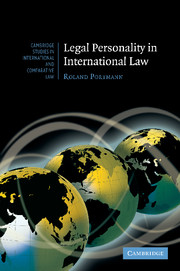Book contents
- Frontmatter
- Contents
- Foreword
- Acknowledgments
- Table of Cases
- List of Abbreviations
- Introduction
- Part I The concept of personality in international law
- Part II The conceptions of personality in international law: their origins and legal manifestations
- 4 Early doctrine and practice
- 5 The states-only conception
- 6 The recognition conception
- 7 The individualistic conception
- 8 The formal conception
- 9 The actor conception
- Part III A framework for personality in international law
- Bibliography
- Index
- Titles in the series
- References
8 - The formal conception
Published online by Cambridge University Press: 05 October 2010
- Frontmatter
- Contents
- Foreword
- Acknowledgments
- Table of Cases
- List of Abbreviations
- Introduction
- Part I The concept of personality in international law
- Part II The conceptions of personality in international law: their origins and legal manifestations
- 4 Early doctrine and practice
- 5 The states-only conception
- 6 The recognition conception
- 7 The individualistic conception
- 8 The formal conception
- 9 The actor conception
- Part III A framework for personality in international law
- Bibliography
- Index
- Titles in the series
- References
Summary
The formal conception articulates no presumption for a particular entity to be an international person. The international legal system is declared completely open: anyone being the addressee of an international norm (right, duty or capacity) is an international person. Consequently, international personality is an a posteriori concept. In principle, there are also no direct legal consequences attached to being an international person. In particular, the capacity to create international law does not follow from personality. Hans Kelsen formulated the formal conception as part of his pure theory of law. It has been advocated, among others, by Paul Guggenheim, D. P. O'Connell and, perhaps most prominently, Julio A. Barberis. The main legal manifestations of the conception are the LaGrand and Avena decisions of the ICJ as well as mixed claims under BITs and human rights treaties in general.
Basic propositions
The formal conception declares personality in international law an essentially open concept. There are no limits as to which entities can be international persons:
Examinant le domaine de validité personnel du droit international, il convient de se demander pour quels sujets vaut cet ordre, à qui il s'adresse, c'est-à-dire quels sont les sujets dont il règle la conduite, les droits et les devoirs. Nous aurons à montrer qu'à cet égard la validité du droit international ne connaît pas de limites.
- Type
- Chapter
- Information
- Legal Personality in International Law , pp. 173 - 207Publisher: Cambridge University PressPrint publication year: 2010

